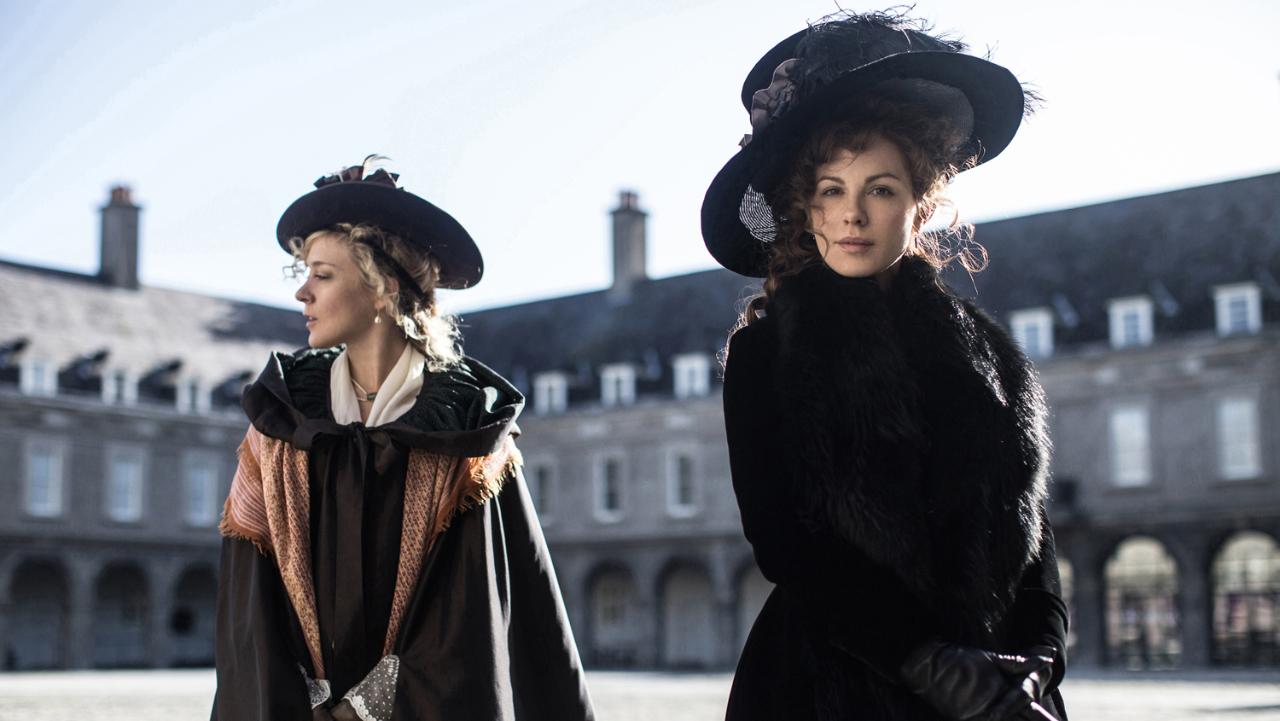Review: Whit Stillman’s Hilarious Love & Friendship Focuses on Jane Austen’s Humor

It seems to me, if you like Whit Stillman’s films, you probably love them. If you truly dislike his humor and preoccupation with the bourgeois lifestyle’s preoccupation with codes of conduct, Love & Friendship might just not be your cup of tea. However, if you are a Whit Stillman fan (Metropolitan, Barcelona, Last Days of Disco, and Damsels in Distress), consider this high praise: Love & Friendship is exactly what you would expect from Stillman adapting Jane Austen, focusing on some of the period’s absurdities of love, marriage and inheritance.
The decision makes perfect sense. Lady Susan is perhaps the least-known of Austen’s novels and, as a novella written as letters, is structurally different from her best-known works. Lady Susan (Kate Beckinsale) is also perhaps the oldest of Austen’s heroines–a widow searching for a husband both for herself and her daughter, which significantly and logically changes her views of marriage. She is a fountain of “wisdom”, which shows a more cynical view of the world and women’s role in it. True love is far from her primary concern, and the hunt for a husband is as much about strategy and schemes as it is about actual attraction and romance. While most adaptions of Austen have focused on the romances of characters (although many have also been genuinely funny as well), Stillman essentially disregards the romances to focus exclusively on comedy. After all, there’s nothing romantic about what anyone’s doing here. Stillman mines not only from Lady Susan, but Austen’s consistently overlooked skills as a humorist.
Stillman has clearly always liked and been inspired by Austen’s work, as she emerged frequently in his previous films. Metropolitan‘s Audrey has such love for Austen’s work that she is moved to tears seeing the author’s works in a thrift store window while feeling especially down. But all Stillman’s comedies of manners have essentially focused on what surrounds courtship in society, and the gatherings at deb parties, discos and colleges are treated no differently by Stillman than Austen’s parlor rooms and social gatherings. In fact, with the exception of Barcelona and its traveling buddy-comedy aspects, Love & Friendship is probably Stillman’s most visually ambitious film because of how it opens up the world. While Disco was period-set, it never felt time-specific. Love & Friendship embraces that detail, and always impressively. So often period films get so weighed down with historical detail that they fail to go that extra step and express deeper meaning. The homes and costumes are specific not just to the times, but show something of the characters and marriages Lady Susan invades. The musical choices are also rather brilliant, suggesting a comic sense of doom when Lady Susan invades her next space during her manhunt for herself and her daughter.
Kate Beckinsale has always been underrated as an actress, fit into too many underwritten roles which don’t utilize her specific strengths. Here, she owns the screen in her funniest performance ever as a true unapologetic anti-heroine, hidden behind a sly smile and cheery flirtation. This film also reunites her with Chloë Sevigny, although that passive-aggressive friendship from Disco has now become the true friendship of two street-smart women who scheme to make their way through society. Sevigny plays an American woman married to a man she doesn’t love (Stephen Fry), and Stillman embraces the modern coolness Sevigny naturally brings despite the period setting. Shameless’s Emma Greenwell and Jemma Redgrave play mother and daughter trying to keep Susan from winning over their brother/son (Xavier Samuel), and all three play the classic screwball family in the middle of everything which keeps the film moving at a breezy speed. But the highlight of the film’s many strong performances has to be Tom Bennett’s Sir Martin, who has only a few brief moments to play the fool in this society, a character slightly out of touch with “society” despite being a part of it. His jumbled nerves and inarticulate speech while trying to win Lady Susan is so delightfully goofy that he immediately becomes the most likable character in the film.
The only issue with a film like Love & Friendship is ultimately a bit of a double-edged sword. The age of a character like Lady Susan (and others) is what justifies negotiating marriage without the focus on love; the desperate circumstances they find themselves in is why they have become cunning. But this also means what used to be explained away in Stillman’s films as youthful obliviousness to their sense of privilege is front and center. In his previous films, he had flawed yet lovable characters to connect to (Alice in Disco, Nick and Audrey in Metropolitan, almost everyone in Damsels in Distress). But in Love & Friendship it is almost impossible to emotionally attach to any of the characters we spend a majority of the time with (except for a general sense of empathy for women in these historical circumstances). While none of them could be described as hateful, this ultimately keeps the characters at arm’s length and may keep people from connecting to this film the way they have to his other works–but it also allows the film to be a breezy, nonstop comedy, and the funniest film of the year so far.
—The Mary Sue has a strict comment policy that forbids, but is not limited to, personal insults toward anyone, hate speech, and trolling.—
Follow The Mary Sue on Twitter, Facebook, Tumblr, Pinterest, & Google+.
Have a tip we should know? tips@themarysue.com